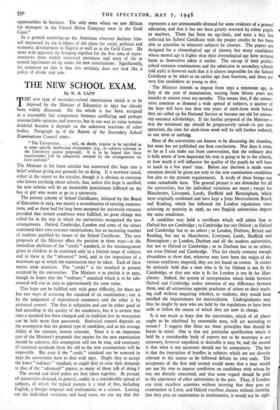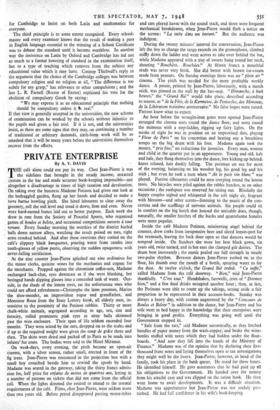THE NEW SCHOOL EXAM.
By W. B. YAPP
THE new type of secondary-school examination which is to be imposed by the Minister of Education in 1951 has already been widely discussed. On the whole it has been accepted as a reasonably fair compromise between conflicting and perhaps irreconcilable opinions and interests, but in one way its value remains doubtful because it depends on the unknown reactions of other bodies. Paragraph 24 of the Report of the Secondary School Examinations Council states : " The Universities . . . . will, no doubt, require to be satisfied as to some specific intellectual attainments (e.g., in subjects relevant to the University course proposed). It is to be hoped that these requirements will be adequately covered by the arrangements we have outlined."
The Minister in his latest circular has converted this hope into a belief without giving any grounds for so doing. It is nowhere stated, either in the report or the circular, though it is obvious to everyone who knows anything about schools, that, unless this hope is satisfied, the new scheme will be an intolerable punishment inflicted on the boy or girl who wants to go to a university.
The present scheme of School Certificates, initiated by the Board of Education in 1914, was mainly a co-ordination of existing examina- tions, and as these had for long been accepted for university entrance provided that certain conditions were fulfilled, no great change was called for in the way in which the universities recognised the new arrangements. Oxford, Cambridge, London and some of the others continued their own entrance examinations, but an increasing number of students qualified by means of the School Certificate. The new proposals of the Minister affect the position in three ways—in the immediate abolition of the " credit " standard, in the encouragement given to children to be examined only in a limited range of subjects and in these at the " advanced " level, and in the imposition of a minimum age at which the examination may be taken. Each of these merits some attention. The "credit" is the standard at present accepted by the universities. The Minister is to abolish it in 1951, though he hopes that the "ordinary" standard which is to be sub- stituted will rise in t952 to approximately the same value.
This hope can be fulfilled only with great difficulty, for there are but two ways of assessing the standard of an examination ; one is by the judgement of experienced examiners and the other is by statistical control. The first is subjective and can be either good or bad according to the quality of the examiners, but it is certain that once a standard has been changed and its tradition lost its restoration can be little more than guesswork. Statistical control depends on the assumption that the general type of candidate, and so the average ability of the entrants, remain constant. Since it is an important part of the Minister's proposals that entries for the new examination should be selective, this assumption will not be true, and continuity of statistical standards from the old to the new examinations will be impossible. But even if the " credit " standard can be restored in 1952 the universities have to deal with 1951. Ought they to accept the lower " ordinary " standard, or ought they to raise their demands to that of the " advanced " papers, as many of them talk of doing ?
The second and third points are best taken together. At present all universities demand, in general, credits in a considerable spread of subjects, of which the typical pattern is a total of five, including English, a foreign language and mathematics or a science. Leaving out the individual variations and hard cases, we can say that this represents a not unreasonable demand for some evidence of a general education, and that it has not been greatly resented by either pupils or teachers. There has been no age-limit, and once a boy has collected his School Certificate with the proper credits he has been able to specialise in whatever subjects he chooses. The papers are designed for a chronological age of sixteen, but many candidates whose mental age is higher than their chronological age have without harm to themselves taken it earlier. The set-up of both public- school entrance examinations and the admission to secondary schools (old style) is however such that it is almost impossible for the School Certificate to be taken at an earlier age than fourteen, and there are very few candidates as young as this.
The Minister intends to impose from 1951 a minimum age, in July of the year of examination, varying from fifteen years ten months to sixteen years ten months. This means that, if the univer- sities continue to demand a wide spread of subjects, a quarter of the boys will have less than two years of sixth-form work before
they are called up for National Service or become too old for univer- sity entrance scholarships. If the further proposal of the Minister—. that the minimum age should be progressively raised—is put into operation, the time for sixth-form work will be still further reduced, to one term or nothing.
Most of the universities are known to be discussing the situation, but none has yet published any firm conclusions. Nor does it seem, so far as I can make out from conversation, that the ordinary don is fully aware of how important his vote is going to be to the schools, or how much it will influence the quality of the pupils he will have to teach in a few years' time. Before any decision is made some attention should be given not only to the new examination conditions but also to the present requirements. A study of these brings out some remarkable facts. The general picture is not dissimilar for all the universities, but the individual variations are many ; except for Manchester, Liverpool, Leeds, Sheffield and Birmingham, which were originally combined and have kept a Joint Matriculation Board, and Reading, which has followed the London regulations since achieving its majority in 1926, no two English universities impose the same conditions.
A candidate may hold a certificate which will admit him to Oxford but not Cambridge ; to Cambridge but not Oxford ; to Oxford and Cambridge but to no others ; to London, Durham, Bristol and Reading, but not to Manchester, Liverpool, Leeds, Sheffield and Birmingham ; to London, Durham and all the modem universities, but not to Oxford or Cambridge ; or to Durham but to no others, not even Oxford and Cambridge. This list clearly contains enough absurdities to show that, whatever may have been the origin of the various conditions imposed, they are not based on reason. It cannot be seriously held that a man who is fit for Oxford is not fit for Cambridge, or that one who is fit for London is not fit for Man- chester. Indeed, the system of incorporation which holds between Oxford and Cambridge makes nonsense of any difference between them, and all universities appoint graduates of others to their teach- ing staff without enquiring whether, as students, they would have satisfied the requirements for matriculation. Undergraduates may thus be taught by men who are held by the regulations to have been unfit to follow the course of which they are now in charge.
Is it too much to hope that the universities, which of all places ought to be inhabited by reasonable men, will act according to reason ? I suggest that there are three principles that should be borne in mind. One is that any particular qualification which is held by a considerable body of experts not to be necessary is not necessary, however expedient or desirable it may be, and the second is that what is not necessary should not be compulsory. The last is that the imposition of hurdles in subjects which are not directly relevant to the course to be followed defeats its own ends. The acceptance of the first and second would mean that a man would not use his vote to impose conditions on candidates with whom he was not directly concerned, and that some regard should be paid to the experience of other universities in the past. Thus, if London can train excellent scientists without insisting that they pass an examination in Latin, and Oxford excellent classics without insisting that they pass an examination in mathematics, it would not be right for Cambridge to insist on both Latin and mathematics for everyone.
The third principle is to some extent recognised. Every school- master and every examiner knows that the result of making a pass in English language essential to the winning of .a School Certificate was 'to debase the standard until it became worthless. In another way the insistence on Latin by Oxford and Cambridge has led not so much to a formal lowering of standard in the examination itself, but to a type of teaching which removes from the subject any educational value which it may have.. Connop Thiriwall's reply to the argument that the choice of the Cambridge colleges was between compulsory religion and no religion at all, " The difference is too subtle for my grasp," has relevance to other compulsions ; and the late L. R. Farnell (Rector of Exeter) explained his vote for the abolition .of compulsory Greek by saying: "We may express it as an educational principle that nothing should be compulsory unless it es real."
If that view is generally accepted in the universities, the new scheme of examination can be worked by the schools without injustice to the pupils and given a fair trial. If it is not, and the universities insist, as there are some signs that they may, on continuing a number of traditional or arbitrary demands, sixth-form work will be so smashed that it will be many years before the universities themselves recover from the effects.



































 Previous page
Previous page